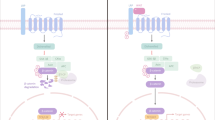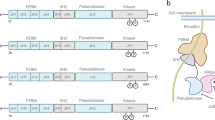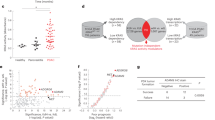Abstract
Transforming growth factor-β (TGFβ) is enriched in the bone matrix and serves as a key factor in promoting bone metastasis in cancer. In addition, TGFβ signaling activates mammalian target of rapamycin (mTOR) functions, which is important for the malignant progression. Here, we demonstrate that TGFβ regulates the level of microRNA-96 (miR-96) through Smad-dependent transcription and that miR-96 promotes the bone metastasis in prostate cancer. The enhanced effects in cellular growth and invasiveness suggest that miR-96 functions as an oncomir/and metastamir. Supporting this idea, we identified a downstream target of the TGFβ-miR-96 signaling pathway to be AKT1S1 mRNA, whose translated protein is a negative regulator of mTOR kinase. Our findings provide a novel mechanism accounting for the TGFβ signaling and bone metastasis.
This is a preview of subscription content, access via your institution
Access options
Subscribe to this journal
Receive 50 print issues and online access
$259.00 per year
only $5.18 per issue
Buy this article
- Purchase on Springer Link
- Instant access to full article PDF
Prices may be subject to local taxes which are calculated during checkout






Similar content being viewed by others
References
Ikushima H, Miyazono K . TGFbeta signalling: a complex web in cancer progression. Nat Rev Cancer 2010; 10: 415–424.
Bhowmick NA, Chytil A, Plieth D, Gorska AE, Dumont N, Shappell S et al. TGF-beta signaling in fibroblasts modulates the oncogenic potential of adjacent epithelia. Science 2004; 303: 848–851.
Li X, Placencio V, Iturregui JM, Uwamariya C, Sharif-Afshar AR, Koyama T et al. Prostate tumor progression is mediated by a paracrine TGF-beta/Wnt3a signaling axis. Oncogene 2008; 27: 7118–7130.
Ao M, Williams K, Bhowmick NA, Hayward SW . Transforming growth factor-beta promotes invasion in tumorigenic but not in nontumorigenic human prostatic epithelial cells. Cancer Res 2006; 66: 8007–8016.
Lee C, Sintich SM, Mathews EP, Shah AH, Kundu SD, Perry KT et al. Transforming growth factor-beta in benign and malignant prostate. Prostate 1999; 39: 285–290.
Tian M, Schiemann WP . The TGF-beta paradox in human cancer: an update. Future Oncol 2009; 5: 259–271.
Derynck R, Zhang YE . Smad-dependent and Smad-independent pathways in TGF-beta family signalling. Nature 2003; 425: 577–584.
Lamouille S, Derynck R . Cell size and invasion in TGF-beta-induced epithelial to mesenchymal transition is regulated by activation of the mTOR pathway. J Cell Biol 2007; 178: 437–451.
Lamouille S, Connolly E, Smyth JW, Akhurst RJ, Derynck R . TGF-beta-induced activation of mTOR complex 2 drives epithelial-mesenchymal transition and cell invasion. J Cell Sci 2012; 125: 1259–1273.
Bertoldo F, Silvestris F, Ibrahim T, Cognetti F, Generali D, Ripamonti CI et al. Targeting bone metastatic cancer: role of the mTOR pathway. Biochim Biophys Acta 2014; 1845: 248–254.
Guertin DA, Sabatini DM . Defining the role of mTOR in cancer. Cancer Cell 2007; 12: 9–22.
Sancak Y, Thoreen CC, Peterson TR, Lindquist RA, Kang SA, Spooner E et al. PRAS40 is an insulin-regulated inhibitor of the mTORC1 protein kinase. Mol cell 2007; 25: 903–915.
Vander Haar E, Lee SI, Bandhakavi S, Griffin TJ, Kim DH . Insulin signalling to mTOR mediated by the Akt/PKB substrate PRAS40. Nat Cell Biol 2007; 9: 316–323.
Zoncu R, Efeyan A, Sabatini DM . mTOR: from growth signal integration to cancer, diabetes and ageing. Nat Rev Mol Cell Biol 2011; 12: 21–35.
Nicoloso MS, Spizzo R, Shimizu M, Rossi S, Calin GA . MicroRNAs—the micro steering wheel of tumour metastases. Nat Rev Cancer 2009; 9: 293–302.
Butz H, Racz K, Hunyady L, Patocs A . Crosstalk between TGF-beta signaling and the microRNA machinery. Trends Pharmacol Sci 2012; 33: 382–393.
Liu YN, Abou-Kheir W, Yin JJ, Fang L, Hynes P, Casey O et al. Critical and reciprocal regulation of KLF4 and SLUG in transforming growth factor beta-initiated prostate cancer epithelial-mesenchymal transition. Mol Cell Biol 2012; 32: 941–953.
Liu YN, Yin JJ, Abou-Kheir W, Hynes PG, Casey OM, Fang L et al. MiR-1 and miR-200 inhibit EMT via Slug-dependent and tumorigenesis via Slug-independent mechanisms. Oncogene 2013; 32: 296–306.
Taylor BS, Schultz N, Hieronymus H, Gopalan A, Xiao Y, Carver BS et al. Integrative genomic profiling of human prostate cancer. Cancer Cell 2010; 18: 11–22.
Haflidadottir BS, Larne O, Martin M, Persson M, Edsjo A, Bjartell A et al. Upregulation of miR-96 enhances cellular proliferation of prostate cancer cells through FOXO1. PLoS ONE 2013; 8: e72400.
Yin JJ, Zhang L, Munasinghe J, Linnoila RI, Kelly K . Cediranib/AZD2171 inhibits bone and brain metastasis in a preclinical model of advanced prostate cancer. Cancer Res 2010; 70: 8662–8673.
Majumder PK, Febbo PG, Bikoff R, Berger R, Xue Q, McMahon LM et al. mTOR inhibition reverses Akt-dependent prostate intraepithelial neoplasia through regulation of apoptotic and HIF-1-dependent pathways. Nat Med 2004; 10: 594–601.
Chen Z, Trotman LC, Shaffer D, Lin HK, Dotan ZA, Niki M et al. Crucial role of p53-dependent cellular senescence in suppression of Pten-deficient tumorigenesis. Nature 2005; 436: 725–730.
Martin P, Liu YN, Pierce R, Abou-Kheir W, Casey O, Seng V et al. Prostate epithelial Pten/TP53 loss leads to transformation of multipotential progenitors and epithelial to mesenchymal transition. Am J Pathol 2011; 179: 422–435.
Fendler A, Jung M, Stephan C, Erbersdobler A, Jung K, Yousef GM . The antiapoptotic function of miR-96 in prostate cancer by inhibition of FOXO1. PLoS ONE 2013; 8: e80807.
Lin H, Dai T, Xiong H, Zhao X, Chen X, Yu C et al. Unregulated miR-96 induces cell proliferation in human breast cancer by downregulating transcriptional factor FOXO3a. PLoS ONE 2010; 5: e15797.
Yu S, Lu Z, Liu C, Meng Y, Ma Y, Zhao W et al. miRNA-96 suppresses KRAS and functions as a tumor suppressor gene in pancreatic cancer. Cancer Res 2010; 70: 6015–6025.
Bedi A, Chang X, Noonan K, Pham V, Bedi R, Fertig EJ et al. Inhibition of TGF-beta enhances the in vivo antitumor efficacy of EGF receptor-targeted therapy. Mol Cancer Ther 2012; 11: 2429–2439.
Sun C, Wang L, Huang S, Heynen GJ, Prahallad A, Robert C et al. Reversible and adaptive resistance to BRAF(V600E) inhibition in melanoma. Nature 2014; 508: 118–122.
Brown K, Quintanilla M, Ramsden M, Kerr IB, Young S, Balmain A . v-ras genes from Harvey and BALB murine sarcoma viruses can act as initiators of two-stage mouse skin carcinogenesis. Cell 1986; 46: 447–456.
Yadav V, Sultana S, Yadav J, Saini N . Gatifloxacin induces S and G2-phase cell cycle arrest in pancreatic cancer cells via p21/p27/p53. PLoS ONE 2012; 7: e47796.
Gogna R, Madan E, Kuppusamy P, Pati U . Re-oxygenation causes hypoxic tumor regression through restoration of p53 wild-type conformation and post-translational modifications. Cell Death Dis 2012; 3: e286.
Liu C, Zhu Y, Lou W, Nadiminty N, Chen X, Zhou Q et al. Functional p53 determines docetaxel sensitivity in prostate cancer cells. Prostate 2013; 73: 418–427.
Skjoth IH, Issinger OG . Profiling of signaling molecules in four different human prostate carcinoma cell lines before and after induction of apoptosis. Int J Oncol 2006; 28: 217–229.
Mishra S, Deng JJ, Gowda PS, Rao MK, Lin CL, Chen CL et al. Androgen receptor and microRNA-21 axis downregulates transforming growth factor beta receptor II (TGFBR2) expression in prostate cancer. Oncogene 2014; 33: 4097–4106.
Yin J, Pollock C, Tracy K, Chock M, Martin P, Oberst M et al. Activation of the RalGEF/Ral pathway promotes prostate cancer metastasis to bone. Mol Cell Biol 2007; 27: 7538–7550.
Subramanian A, Tamayo P, Mootha VK, Mukherjee S, Ebert BL, Gillette MA et al. Gene set enrichment analysis: a knowledge-based approach for interpreting genome-wide expression profiles. Proc Natl Acad Sci USA 2005; 102: 15545–15550.
Acknowledgements
This work was jointly supported by grants from the Taipei Medical University-Wan Fang Hospital (102TMU-WFH-05) to Y-N Liu, Taipei Medical University (TMU102-AE1-B30) to Y-C Tsai, the Ministry of Science and Technology (NSC102-2320-B-038-001) of Taiwan to Y-N Liu, and the Ministry of Science and Technology (NSC103-2311-B-038-001) of Taiwan to Y-C Tsai. We also thank Dr Ji-Hshiung Chen (Tzu Chi University) for reading the manuscript and for his comments and helpful suggestions. We also thank Dr Orla Casey for reviewing our manuscript and discussion.
Author information
Authors and Affiliations
Corresponding authors
Ethics declarations
Competing interests
The authors declare no conflict of interest.
Additional information
Supplementary Information accompanies this paper on the Oncogene website
Rights and permissions
About this article
Cite this article
Siu, M., Tsai, YC., Chang, YS. et al. Transforming growth factor-β promotes prostate bone metastasis through induction of microRNA-96 and activation of the mTOR pathway. Oncogene 34, 4767–4776 (2015). https://doi.org/10.1038/onc.2014.414
Received:
Revised:
Accepted:
Published:
Issue Date:
DOI: https://doi.org/10.1038/onc.2014.414
This article is cited by
-
Secreted miR-210-3p, miR-183-5p and miR-96-5p reduce sensitivity to docetaxel in prostate cancer cells
Cell Death Discovery (2023)
-
Widespread 8-oxoguanine modifications of miRNA seeds differentially regulate redox-dependent cancer development
Nature Cell Biology (2023)
-
miR-96-5p, miR-134-5p, miR-181b-5p and miR-200b-3p heterogenous expression in sites of prostate cancer versus benign prostate hyperplasia—archival samples study
Histochemistry and Cell Biology (2021)
-
Molecular mechanisms and clinical management of cancer bone metastasis
Bone Research (2020)
-
miRNAs expression signature potentially associated with lymphatic dissemination in locally advanced prostate cancer
BMC Medical Genomics (2020)



